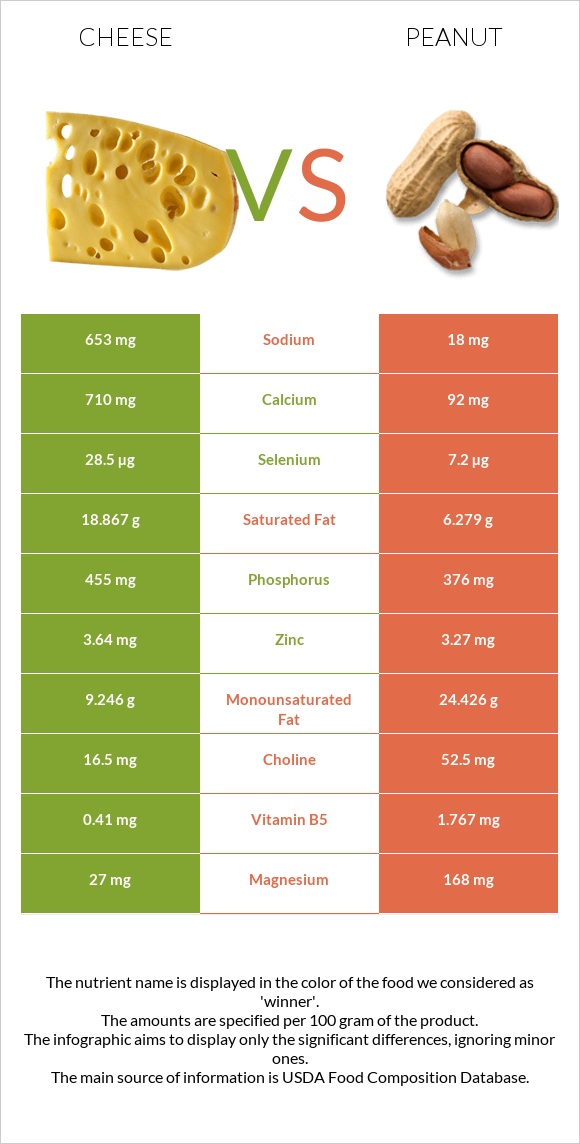Cheese vs. Peanut — In-Depth Nutrition Comparison
Compare
What are the main differences between cheese and peanuts?
- Cheese is richer in calcium and vitamin B12, while peanuts are higher in copper, manganese, vitamin B3, iron, folate, vitamin B1, and vitamin E.
- Peanuts' daily need coverage for copper is 124% higher.
- Peanuts are lower in saturated fat.
- Peanuts have a higher glycemic index (13) than cheese (0).
We used Cheese, cheddar and Peanuts, all types, raw types in this comparison.
Infographic

Infographic link
Mineral Comparison
Mineral comparison score is based on the number of minerals by which one or the other food is richer. The "coverage" charts below show how much of the daily needs can be covered by 300 grams of the food.
| Contains more CalciumCalcium | +671.7% |
| Contains more ZincZinc | +11.3% |
| Contains more PhosphorusPhosphorus | +21% |
| Contains more SeleniumSelenium | +295.8% |
| Contains more MagnesiumMagnesium | +522.2% |
| Contains more PotassiumPotassium | +827.6% |
| Contains more IronIron | +3171.4% |
| Contains more CopperCopper | +3713.3% |
| Contains less SodiumSodium | -97.2% |
| Contains more ManganeseManganese | +7063% |
Vitamin Comparison
Vitamin comparison score is based on the number of vitamins by which one or the other food is richer. The "coverage" charts below show how much of the daily needs can be covered by 300 grams of the food.
| Contains more Vitamin AVitamin A | +∞% |
| Contains more Vitamin DVitamin D | +∞% |
| Contains more Vitamin B2Vitamin B2 | +217% |
| Contains more Vitamin B12Vitamin B12 | +∞% |
| Contains more Vitamin KVitamin K | +∞% |
| Contains more Vitamin EVitamin E | +1073.2% |
| Contains more Vitamin B1Vitamin B1 | +2106.9% |
| Contains more Vitamin B3Vitamin B3 | +20350.8% |
| Contains more Vitamin B5Vitamin B5 | +331% |
| Contains more Vitamin B6Vitamin B6 | +427.3% |
| Contains more FolateFolate | +788.9% |
All nutrients comparison - raw data values
| Nutrient |  |
 |
DV% diff. |
| Copper | 0.03mg | 1.144mg | 124% |
| Polyunsaturated fat | 1.421g | 15.558g | 94% |
| Manganese | 0.027mg | 1.934mg | 83% |
| Vitamin B3 | 0.059mg | 12.066mg | 75% |
| Calcium | 710mg | 92mg | 62% |
| Saturated fat | 18.867g | 6.279g | 57% |
| Iron | 0.14mg | 4.58mg | 56% |
| Folate | 27µg | 240µg | 53% |
| Vitamin E | 0.71mg | 8.33mg | 51% |
| Vitamin B1 | 0.029mg | 0.64mg | 51% |
| Vitamin B12 | 1.1µg | 0µg | 46% |
| Selenium | 28.5µg | 7.2µg | 39% |
| Monounsaturated fat | 9.246g | 24.426g | 38% |
| Vitamin A | 330µg | 0µg | 37% |
| Magnesium | 27mg | 168mg | 34% |
| Fiber | 0g | 8.5g | 34% |
| Cholesterol | 99mg | 0mg | 33% |
| Sodium | 653mg | 18mg | 28% |
| Vitamin B5 | 0.41mg | 1.767mg | 27% |
| Fats | 33.31g | 49.24g | 25% |
| Vitamin B2 | 0.428mg | 0.135mg | 23% |
| Vitamin B6 | 0.066mg | 0.348mg | 22% |
| Potassium | 76mg | 705mg | 19% |
| Phosphorus | 455mg | 376mg | 11% |
| Calories | 404kcal | 567kcal | 8% |
| Choline | 16.5mg | 52.5mg | 7% |
| Protein | 22.87g | 25.8g | 6% |
| Carbs | 3.09g | 16.13g | 4% |
| Vitamin D | 24 IU | 0 IU | 3% |
| Zinc | 3.64mg | 3.27mg | 3% |
| Vitamin D | 0.6µg | 0µg | 3% |
| Vitamin K | 2.4µg | 0µg | 2% |
| Net carbs | 3.09g | 7.63g | N/A |
| Sugar | 0.48g | 4.72g | N/A |
| Trans fat | 0.917g | 0g | N/A |
| Tryptophan | 0.547mg | 0.25mg | 0% |
| Threonine | 1.044mg | 0.883mg | 0% |
| Isoleucine | 1.206mg | 0.907mg | 0% |
| Leucine | 1.939mg | 1.672mg | 0% |
| Lysine | 1.025mg | 0.926mg | 0% |
| Methionine | 0.547mg | 0.317mg | 0% |
| Phenylalanine | 1.074mg | 1.377mg | 0% |
| Valine | 1.404mg | 1.082mg | 0% |
| Histidine | 0.547mg | 0.652mg | 0% |
| Omega-3 - EPA | 0.01g | 0g | N/A |
| Omega-3 - DHA | 0.001g | 0g | N/A |
| Omega-3 - DPA | 0.017g | 0g | N/A |
| Omega-6 - Eicosadienoic acid | 0.007g | N/A |
Macronutrient Comparison
Macronutrient breakdown side-by-side comparison
| Contains more WaterWater | +469.5% |
| Contains more OtherOther | +59.2% |
| Contains more ProteinProtein | +12.8% |
| Contains more FatsFats | +47.8% |
| Contains more CarbsCarbs | +422% |
Fat Type Comparison
Fat type breakdown side-by-side comparison
| Contains less Sat. FatSaturated fat | -66.7% |
| Contains more Mono. FatMonounsaturated fat | +164.2% |
| Contains more Poly. FatPolyunsaturated fat | +994.9% |





